
For those who are inside the whale: We need a new enlightenment
Writer, playwright and filmmaker from Zimbabwe
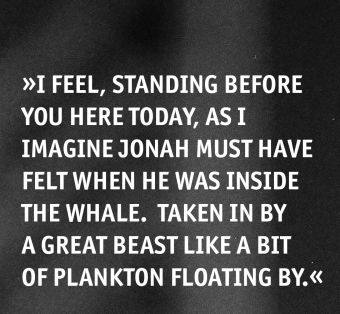
For those who are inside the whale: We need a new enlightenment
Peace Prize of the German Book Trade 2021 – Acceptance Speech of Tsitsi Dangarembga, held on 24.10.2021 in Frankfurt am Main
Dear honoured guests all, I feel, standing before you here today, as I imagine Jonah must have felt when he was inside the whale. Taken in by a great beast like a bit of plankton floating by, landing within the entrails of a massive mammal, not knowing how he will find his way out of the great churning gut, but knowing very well what the end process of being digested is and therefore, while feeling grateful at no longer being tossed in the raging sea, nevertheless also feeling highly excited.
Indeed, the award of the Peace Prize of the German Book Trade 2021 is a cause for great excitement in my life. I did not ever imagine that one day I would stand in this lovely venue in Frankfurt, a city in a country that I conceive of as having been the strong umbilical chord of western empire, in order to receive the German Book Trade’s most distinguished prize. Therefore, I am astonished to stand before you today. At the same time, I am delighted, and I am humbled at this unfolding of events. I am thankful to my publishers, Orlanda Verlag, who first published my work, and then submitted it for consideration; and I thank the jury who recognised positive value in my voice, a voice from that part of the world so often described as other and so often preceded by negative qualifiers. There are seven billion human beings on the planet. I am now one of the few of that great number who understands what a great privilege it is to find oneself in a place that not even imagination had been capable of transporting one to.
Zimbabwe, the nation-state I come from, has never known peace. Various institutionalised forms of violence were practised on black bodies by white bodies in Zimbabwe when British settlers arrived to occupy the land. Officials of the British South Africa Charter Company, the private company founded by Cecil Rhodes in 1889, whose members were outriders of the British Empire, used brutal tactics to bring the local people to heel.
Cecil Rhodes‘ Pioneer column of 500 men armed with an assortment of weapons that included Maxim guns, marched into the area that is now Harare, capital of Zimbabwe, to annexe the land formally for the British Empire in 1893. Ensuing economic violence saw black bodies being taxed in money for the houses they lived in when the invaders arrived. The population did not utilise a money economy at the time, thus the requirement for money forced the population into labour for the settler community on the terms the settler community offered, in order to obtain the money required to comply with the taxation system. Other forms of economic violence included different rates of payment for the same agricultural products, depending on the skin colour of the producer, with black producers being paid less than white producers. There were also restrictions on the goods black people could trade. Nutritional violence was practised by settler authorities through side-lining traditional small grains commercially in favour of less nutritious maize that had been introduced by European settlers. Metaphysical violence included the denigration of pre-colonial belief and other symbolic systems, such as religious, political, knowledge, legal and language systems. This metaphysical violence was part of a deliberate British strategy to create a metaphysical empire.
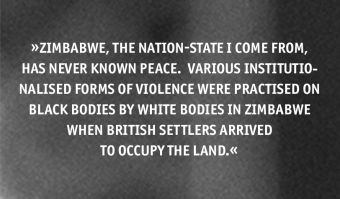
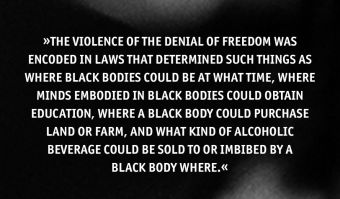
Various forms of violence were unleashed on black bodies as the new settler state evolved. These forms of violence included the banning of black political parties, police brutality, judicial harassment, abduction, detention and torture. The violence of the denial of freedom was encoded in laws that determined such things as where black bodies could be at what time, where minds embodied in black bodies could obtain education, where a black body could purchase land or farm, and what kind of alcoholic beverage could be sold to or imbibed by a black body where.
In 1965, the British settler community of the country, now called Rhodesia, declared their own independence from Great Britain. This declaration of independence by the white population was in response to the British policy of decolonisation through negotiating independence with its colonies that evolved in the 1950s. The new policy was an imperial response to unrest in the colonies where there was political agitation for independence through majority rule. As majority rule in a predominantly black state meant rule by black people, the settler community of Rhodesia acted to prevent it by unilaterally declaring independence from Britain.
Black agitation for majority rule continued in Rhodesia after the Unilateral Declaration of Independence by the white settlers in 1965. New forms of racialised violence were practised. For example, the settler state, fearing being swamped by a rapidly increasing black population, secretly instituted policies for black population control that included tubal ligation of fertile black women without their consent. At the same time, efforts to retain its white population prompted the settler state to institute repressive regulations designed to prevent its white citizens from emigrating. Zimbabwe has always been a violent and repressive state.
As a result of this history, at independence in 1980 Zimbabwe had a violent outgoing settler state. Being born through a brutal liberation struggle in which atrocities that I cannot go into here were committed on both sides, the incoming nationalist state was just as violent. Its military rhetoric focused on conflict, antagonism and enmity, and this is the philosophy that holds sway amongst Zimbabwean authorities to this day. The antagonists and enemies are any entities, including citizens of Zimbabwe and their organisations, that do not comply with the military rulers‘ wishes. Complaints of intimidation and torture by the ZanuPf authorities began as early as 1980, the year of independence. A whole genocide was overlooked by the rest of the world a few years later. Since then violence that uses the atrocious tactics of the liberation struggle has flared up whenever power is contested, usually at election time, but also on other occasions.
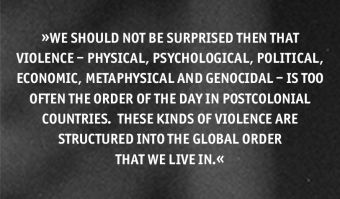
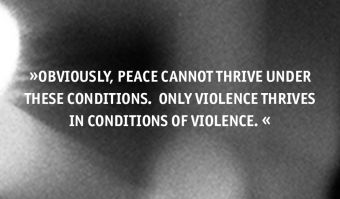
The formative violence of the Zimbabwean nation state is not an isolated historical occurrence. The greater part of the world has experienced the multi-faceted violence that I have described in the Zimbabwean case at the hands of western empire. This violence is standard for all the imperial enterprise practised by the western quarter of the world on the rest of the globe, a process that began in the fifteenth century. In fact in some cases, such as the USA the process was even more violent with entire nations being wiped out through genocide. We should not be surprised then that violence – physical, psychological, political, economic, metaphysical and genocidal – is too often the order of the day in postcolonial countries. These kinds of violence are structured into the global order that we live in, and have their root in the structures of western empire that began to be formed over half a millennium ago. This is to say that the west, with all its technology and belief systems and practices, is built on these multiple ongoing forms of violence, which it exported to the rest of the world and which are now practiced as eagerly in postcolonial states as they were by imperial and colonial states.
Obviously, peace cannot thrive under these conditions. Only violence thrives in conditions of violence. It is a well-known fact that violence begets violence and we see this all over the world today, even in the various homes of empire. Imperial violence created conditions that caused many people to leave their homes and migrate to imperial countries. Citizens of the imperial countries resent this and mete out violence onto the bodies of the immigrants in various ways, including through institutional violence that is justified as an administrative necessity, a justification that was also given during the colonial era. At the same time, nationals of imperial nations who have a more developed sense of peace and justice take on their country mates who mete out violence to immigrants and conflict results in the imperial heartland. It is clearly a no-win situation. What are we to do, then, to foster peace? Clearly the world structure that ushered in the specific kinds of violence of our era cannot easily be undone. The more than seven billion of us human residents of this planet are today all connected to and embedded in that global system.
Here is an answer, and I personally believe that this answer is simpler than we might think. The violent world order we live in now was brought about by certain hierarchical modes of thinking. The solution is to undo the racialised and other hierarchical modes of thinking based on demographics such as gender, sex, religion, nationality and class, and any other, that were and continue to be the building blocks of empire throughout history, throughout the world.
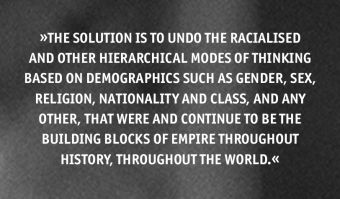
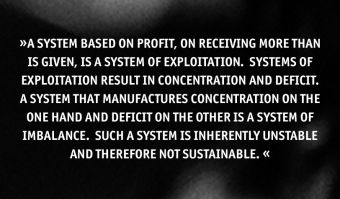
Our current global dispensation does invest large amounts of money into influencing group behaviour. Methods of influencing group behaviour are taught in courses for disciplines such as marketing and business studies, politics and propaganda studies all over the world. Such courses teach students how to define a target group by segmenting a population according to a range of demographics. The desires of this population are then manipulated with the aim of this manipulation being not the good of the people concerned or an increase in peace, but in order to maximise something that we refer to as profit. This may be financial, political, social or any other kind of human profit.
I put it to you that this thing we call profit does not in fact exist. In absolute terms, the notion of profit is a fallacy. In the dimension of the human, and the world we inhabit physically, events and matter are localised in time and space. Value that appears in one time and place is value that has been removed from another time and place. A system based on profit, on receiving more than is given, is a system of exploitation. Systems of exploitation result in concentration and deficit. A system that manufactures concentration on the one hand and deficit on the other is a system of imbalance. Such a system is inherently unstable and therefore not sustainable. How then have we come to invest in an unstable, unsustainable system that is bound to lead to our downfall?
A little less than four hundred years ago, a Frenchman wrote a long paragraph on the nature of certainty, that is the nature of knowledge without doubt. One phrase of this long paragraph has come down to us. This is the phrase „I think therefore I am“, now one of the most famous and well-known phrases of western philosophy. In this conceptualisation of the world, „I think“ is the only direct, irrefutable evidence a person has of their existence. All other evidence could be false. „I think“ was said to indicate „I am“ or a person’s being, and this position came to be formulated as „I think therefore I am“.
To me, a person who has had the good fortune to access another knowledge system besides the western, experientially rather than intellectually, since childhood, the dangers of such an epistemology are glaring. Firstly, as is well recognised, the famous phrase is only a short version of what was originally expressed. The original expression included the useful nature of doubt in ascertaining knowledge: I doubt, therefore I think, therefore I am. But those very thought processes said to obtain knowledge through doubt refused to doubt and instead opted for the certainty of „I think therefore I am“, the version that has now become common philosophical currency.
What are the effects of such a common philosophical currency? To think is to conduct an inner narrative. This process of inner narrative is composed of process on one hand – how we narrate to ourselves; and content on another hand – what we narrate to ourselves. Equating the process of one’s, or the „I’s“, thinking or inner narrative with being results in multiple errors in our knowledge. Allow me to mention two, that are particularly relevant to my feeling like Jonah inside the whale. Both of these errors refer to difference.
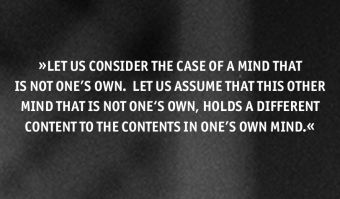
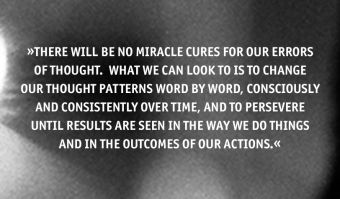
Let us consider the case of a mind that is not one’s own. Let us assume that this other mind that is not one’s own, holds a different content to the contents in one’s own mind; or that it utilises a different system of evoking and arranging contents and thus of delivering meaning; or that it differs from one’s own mind in both content and process. Those who believe that being in the world and knowing in the world is based on „I think“, may very easily come to the conclusion that a mind that uses different contents for representing and different processes of combining contents does not think at all, and therefore does not represent an „I“ at all.
Let us now go on to assume that this mind that is not one’s own is embodied. It is easy to see how such an embodied being that is not oneself, that does not think as oneself does, and therefore is said not to think, is very likely to evoke in one’s mind the content „They do not think, therefore they are not“. Since the thinker of „I think therefore I am“ perceives of themself as human, those who think differently are perceived of as being not like me, or not human. As we know, this denial of the human value of other human beings has the effect of raising the human value we ascribe to ourselves; and as we also know, this mechanism of differential attribution of humanity has been responsible for much of the violence that human beings have visited on each other.
I make this point not to discredit the Enlightenment. It is very hard for me, someone who is not personally connected directly to the history of Europe and its narrative, to imagine what life here was like during the Dark Ages through the Middle Ages, and how deeply the thought revolution that was the Enlightenment was needed. My point is to add my voice to those who say the Enlightenment of yester-century has run its course so that we, all of us on this planet today are in great need of a new enlightenment.
The knowledges of yesteryear and yester-century do not suffice. They did not save us. In my part of the world, our philosophy of living was encapsulated in the idea „I am because you are“ now recognised as the philosophy of ubuntu. This philosophy is still expressed in greetings such as „I am well if you are well too“, but this philosophy did not save us. We must invent new thought, drag it out from where it is nascent in the folds of the universe to effect the paradigm shift in our ways of knowing and valuing and ascribing meaning that is necessary for our survival as we see oceans polluted, ozone depleted, climate changing, temperatures and shorelines rising, diseases ravaging in spite of science, hunger proliferating, and black bodies drowning in oceans on their way to join those who first sailed to join them, becoming this epoch’s most enduring sacrifice to what it calls progress.
There will be no miracle cures for our errors of thought. What we can look to is to change our thought patterns word by word, consciously and consistently over time, and to persevere until results are seen in the way we do things and in the outcomes of our actions. I would like to suggest that one way in which the human community in Germany may contribute to do this is through changing thinking around the N-word. I have heard that there is an ongoing dispute here about the nature of the N-word and whether it is inherently violent, with some arguing that it is not, so that those who choose to use it are not choosing to use a violent, but only a factual content. At the same time, those who are the object of those who use the N-word to refer to them, and their allies in the country, testify to the N-word’s violent nature. In such cases, the choice is ours, whether to valourise the „I“ of „I think“ or to look beyond this „I“ to „We“ in our choice of the contents we entertain in our minds. To look beyond the „I“ to the „We“ could lead to mind-expanding reformulations of the Frenchman’s phrase, to, for example, „We think, therefore we are“; or even to „We are, therefore we think“, thereby, with this latter, changing the location of valourisation from the rational „think“ to the experiential „are“
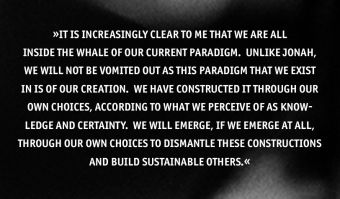
Indeed, my sense of being inside the whale may not apply only to myself. It is increasingly clear to me that we are all inside the whale of our current paradigm. Unlike Jonah, we will not be vomited out as this paradigm that we exist in is of our creation. We have constructed it through our own choices, according to what we perceive of as knowledge and certainty. We will emerge, if we emerge at all, through our own choices to dismantle these constructions and build sustainable others.
Our choices of thought content and process are ultimately a choice between violence producing and peace producing contents and narratives. This is true whether these contents and narratives are expressed only to ourselves in thought, or whether we go on to express them to others around us. Both are generative.
The relationship between thought and narrative and violence and peace is what makes the Peace Prize of the German Book Trade so remarkable. The German Book Trade recognises that the symbols, the words that are put down in books are active in the way that they transmit themselves into our minds and influence our thoughts, with the result that these words in books can play a part in shaping our tendencies towards either peace or violence. The German Book Trade has chosen to honour those contents, words and narratives that promote peaceful understanding of the differences we perceive to exist between us. Indeed, that someone such as myself, who in not-so-distant ages past was, on the basis of several demographics, categorised as not thinking at worst; at best, not thinking in any way that is valuable, and therefore not existing in any way that is valuable, is awarded this prize today is testimony to the capacity we have as human beings for transformation. And so I would like to end by wishing us all happy, paradigm-shifting reading of the kind that effects positive transformation for peace, that is championed so excellently by the Peace Prize of the German Book Trade.
Thank you for your attention this morning.
Tsitsi Dangarembga
Tsitsi Dangarembga, born on February 14, 1959 in Mutoko in present-day north-eastern Zimbabwe, is one of the most important writers, playwrights and filmmakers in her country. Her internationally successful trilogy of novels tells the story of a young woman striving for self-determination in post-colonial Zimbabwe and illustrates the complex mechanisms of oppression associated with gender, colonialism and racism. In 2018, her debut novel Nervous Conditions (1988) was included by the BBC on its list of the 100 most important books that have shaped the world. The 1993 film Neria is based on one of her stories and counts among the most popular films in Zimbabwe. Her latest novel This Mournable Body was shortlisted for the Booker Prize in 2020. In addition to her work as an author and filmmaker, Tsitsi Dangarembga has been active for many years in promoting freedom, women’s rights and political change in Zimbabwe. In 2021, she received the PEN Pinter Prize as well as the PEN International Award for Freedom of Expression, which honours authors who continue their writing despite persecution. On October 24, 2021, she was awarded the Peace Prize of the German Book Trade.
Picture: © Mateusz Żaboklicki
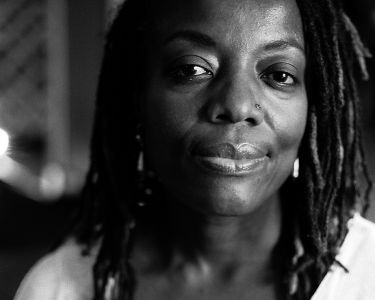

For the word and freedom, one industry stands for free discourse
Represents interests and is central service provider of the German book industry

For the word and freedom, one industry stands for free discourse
This text is a joint contribution of several colleagues at the Börsenvereinsgruppe.
„A conversation presupposes that the other person might be right.“ With this statement, the philosopher Hans Georg Gadamer formulated the basis for respectful interaction. It is a basic prerequisite for a lively culture of debate and indispensable for a democratic opinion-forming process. The book industry has set itself the task of promoting this process and making younger generations aware of its importance. Recently, the discussion about the stand of a right-wing publisher at the Frankfurt Book Fair 2021 showed that a constructive exchange of opinions cannot be taken for granted and that the current climate of debate in our society is highly heated.
This debate was triggered by the call for a boycott by the black German author Jasmina Kuhnke, who stated that she did not feel safe due to previous racist threats caused by the presence of a publisher from the right-wing end of the spectrum at the Frankfurt Book Fair.
She cancelled her participation in an event at the book fair and called on other participants to do the same. Some authors followed her example; others demanded to participate in the Frankfurt Book Fair for this very reason: in order to show their face there and stand up for diversity and against racism. While the traditional media such as print, TV and radio took a differentiated view of the issue, a wave of indignation broke out on social media. On the one hand, this helped that right-wing publishing house to receive a great deal of attention, whose content would otherwise hardly have been disseminated at the book fair. On the other hand, it overlapped the reporting and discussion of other topics at the book fair, leaving little room for a diverse range of topics.
It also became clear during those days in October 2021 that the limits of freedom of expression that apply to our society must be constantly re-discussed.
The Corona crisis also reinforced existing divisive tendencies in our society. During the pandemic, society’s ability to discourse was under particularly high pressure. Expressions of opinion that, under certain circumstances, deviated from the unanimous majority view or ran counter to a vocal minority provoked an aggressive backlash. Riots at demonstrations and physical attacks on reporters in public spaces were just as alarming as the hate and incitement to violence on social media. Germany moved down two places in the 2021 press freedom ranking.


TOGETHER FOR FREEDOM OF EXPRESSION WORLDWIDE
The Börsenverein Group, which consists of the Börsenverein des Deutschen Buchhandels and its subsidiaries Frankfurter Buchmesse GmbH, MVB and Mediacampus, sees as one of its core tasks to defend the freedom of the word as an elementary human right and to guarantee freedom of expression as a prerequisite for freedom of publication and literary diversity. To allow different opinions and currents as long as they remain within the bounds of the law, and to argue one’s own values, is, in the view of the Börsenverein, the right way forward in a pluralistic and democratic society.
At the same time, freedom of expression is under threat from the state in many countries. In an increasing number of countries around the world—be it Saudi Arabia, Turkey, China, Russia, Belarus, Egypt or Vietnam—people are persecuted, imprisoned or murdered simply because they criticise the actions of the government. But in Poland and Hungary, countries in the European Union, free reporting is also restricted.
Publishers and bookstores in Germany stand up for persecuted authors, publishers and booksellers worldwide. The Börsenverein sees it as its task to draw attention to the fate of persecuted cultural workers and to call on the political leaders in Berlin and Brussels to consistently stand up for freedom of expression.
#MehrAlsMeineMeinung
/ #MoreThanMyOpinion
In May 2021, „Freedom of Expression Week“ was held for the first time. Especially in times of pandemic, the Börsenverein felt the time was ripe for a deeper examination of freedom of speech. Together with partners, the association organised a major celebration from May 3 to 10 for the freedom of the word, the value on which everything the book industry stands for is based. Under the motto „More than my opinion,“ around 40 partner organisations took part, including Amnesty International, Reporters without Borders, the Goethe Institute and Eintracht Frankfurt, along with many prominent supporters such as Wolfgang Niedecken, Susanne Fröhlich, Jagoda Marinic and Michel Friedman. The media response from radio to television to print was great. There were also many reactions on social media, most of them very positive.
Central to this week—which will now take place annually and be expanded internationally—was a dialog about the prerequisites and limits of a free and diverse society. The content of the Freedom of Expression Week was based on the Charter of Freedom of Expression. Signing the Charter is a commitment to recognise the eleven principles set out in it, to act in accordance with them and to carry them into one’s own environment and network.
As special places of cultural encounter and social exchange, bookstores moved into the public eye. They positioned themselves as places of freedom of expression: „We booksellers can do a lot to improve the culture of debate in our stores: by making the spectrum of opinions on controversial topics visible in our product range or by organising events that explicitly invite controversial discussions. This is how bookstores can become places of freedom of opinion,“ says Michael Lemling, managing director of the Lehmkuhl bookstore in Munich and spokesman for the Börsenverein’s freedom of opinion interest group.
„We want to promote critical debate and differentiated opinion-forming that uses the power of arguments rather than polemics,“ says Alexander Skipis, Chief Executive Officer of the Börsenverein des Deutschen Buchhandels. “This is the hour of civil society. Let’s work together to ensure that all people can express their opinions freely and without fear, and in such a way that a constructive exchange of ideas emerges from it that moves us forward as a society. Freedom of expression is the driving force of our democracy. Thanks to it, all citizens can have their say in addressing the problems of our time. But we don’t have freedom of expression per se; we have to make use of it every day.“
BOOKS THAT EXPLAIN THE WORLD
Another component of the Group-wide commitment to free discourse is the German Nonfiction Book Prize, which was also awarded for the first time in 2021. The Stiftung Buchkultur und Leseförderung (Book Culture and Reading Promotion Foundation) of the Börsenverein awards this prize to the nonfiction book of the year (Deutsche Sachbuchpreis). The prize is awarded for outstanding nonfiction books written in German that provide impetus for social debate.
The judging criteria are the relevance of the topic, the narrative power of the text, the way it is presented in generally understandable language, and the quality of the research. The nonfiction prize, worth a total of 42,500 Euros, will be awarded at a ceremony in Berlin. It is intended to raise awareness of nonfiction books as a basis for conveying knowledge, forming well-founded opinions and providing impetus for public discourse.
“I can’t imagine a world without books that explain the world. Nonfiction books do just that, and sometimes they even change the world, or at least make it a little better,“ says Margit Ketterle, publishing director of nonfiction at Droemer Knaur, a member of the German Nonfiction Book Award Academy.
Equally important in this context is the role of reading promotion. The group’s reading promotion activities, such as the German Book Trade’s reading competition, the Book Kindergarten Seal of Approval, and campaigns for World Book Day, focus on communicating the joy of reading and awakening reading motivation.
Reading is a basic prerequisite for education, personal development, professional success and creative participation in society. Nowadays, this social participation is more important than ever if we, as individual members of our society, are to actively combat social division and be involved in social debates throughout our lives. In 2021, Stiftung Lesen and the Börsenverein therefore initiated the National Reading Pact, which aims to improve reading promotion in Germany with more than 150 partners. The kick-off event was the National Reading Summit on March 3, 2021.
Conclusion
The Börsenverein des Deutschen Buchhandels (German Publishers and Booksellers Association) and its business enterprises are united in their support for a culture of open debate and create offerings to strengthen the freedom of expression. In doing so, they make a significant contribution to social participation. After all, in order to emerge stronger from a crisis—in line with the Renaissance 4.0 and to enter a new era together with innovative ideas—the Börsenverein group believes that responsible citizens and readers are needed who identify reliable sources, recognise fake news as such, and want to live in an open culture of debate. Everyone should have the opportunity to play a part in tackling our collective challenges in a goal-oriented way. For the word and freedom.

Börsenvereinsgruppe Germany
The Börsenvereinsgruppe represents the interests and is the central service provider of the German book industry. From political work and cultural projects to trade fair organisation, training and continuing education, publishing and technology services, it bundles service and educational offerings for the book and media industry. The group consists of the Börsenverein des Deutschen Buchhandels (German Publishers & Booksellers Association) and its three business subsidiaries:
The Frankfurt Book Fair annually organises the world’s largest book fair in Frankfurt am Main as well as international conferences and represents the German book industry around the globe with joint stands. MVB, a technology and information provider, enables publishers and bookstores in Germany and abroad to market their titles successfully and efficiently with its central platforms based on international metadata standards. mediacampus frankfurt is the central training and continuing education provider for specialists and managers in the book and media industry.
Picture: © Rainer Rüffer

